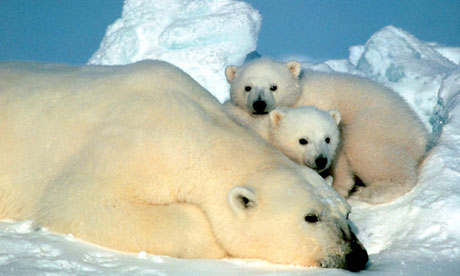1. Five Nations Sign to Protect Arctic from Unregulated Fishing
Years ago, the Bering Sea "Donut Hole" was a popular fishing location for high-seas pollack catches. In 1999 an international agreement was made to ban fishing in the area to protect the species and the food chain of the area. This week, the US, Russia, Canada, Norway, and Denmark/Greenland are establishing a similar agreement for the 1.1 million square mile zone in the central Arctic Ocean. This ban should be a proactive measure to protect the Arctic cod populations. The five countries will refrain from fishing in the area until there is a regulatory system put in place. Read more...
-----------------------------------------------
2. Shark Week 2015 Returns to Science, Breaks Records!
 Last week was an extremely exciting week for Sea Save and all of the shark lovers out there! According to Variety, "Shark Week 2015 averages 1.269 million viewers over the entire seven-day run, topping the event's previous record of 1.201 million, set in 2013". It seems that viewers continued to appreciate the programming although Discovery chose to drop the fictional stories! Read more...
Last week was an extremely exciting week for Sea Save and all of the shark lovers out there! According to Variety, "Shark Week 2015 averages 1.269 million viewers over the entire seven-day run, topping the event's previous record of 1.201 million, set in 2013". It seems that viewers continued to appreciate the programming although Discovery chose to drop the fictional stories! Read more...
-----------------------------------------------
3. Polar Bears Experience Limited Energy Savings in Summer
 This week, a study in Science revealed that polar bears are unlikely to avoid the drastic impacts of climate change. Scientists implanted temperature loggers and trackers into more than two dozen polar bears to test the theory that polar bears may be able to partially compensate for the longer summer food deprivation. These animals use a process called heterothery to avoid unsustainable heat loss while swimming. Although heterothermy is an adaptation to the warm climate temperatures, it is not enough to sustain the polar bear population. Read more...
This week, a study in Science revealed that polar bears are unlikely to avoid the drastic impacts of climate change. Scientists implanted temperature loggers and trackers into more than two dozen polar bears to test the theory that polar bears may be able to partially compensate for the longer summer food deprivation. These animals use a process called heterothery to avoid unsustainable heat loss while swimming. Although heterothermy is an adaptation to the warm climate temperatures, it is not enough to sustain the polar bear population. Read more...
-----------------------------------------------
4. Florida Man Arrested for Riding Sea Turtle
 Every young child probably dreams of riding on the back of a sea turtle at some point in their lives. As you grow up and learn more and more about the ocean ecosystem, you understand that marine life is not a toy. This week, a Miami man was imprisoned after riding a sea turtle and spearing a shark. The shark was an undersized nurse shark and the man put it in a cooler after spearing it. This story is a valuable reminder that humans should respectively observe the underwater world. Read more...
Every young child probably dreams of riding on the back of a sea turtle at some point in their lives. As you grow up and learn more and more about the ocean ecosystem, you understand that marine life is not a toy. This week, a Miami man was imprisoned after riding a sea turtle and spearing a shark. The shark was an undersized nurse shark and the man put it in a cooler after spearing it. This story is a valuable reminder that humans should respectively observe the underwater world. Read more...
-----------------------------------------------
5. Why do Dolphins Hitch Rides on Whales?
Symbiosis... often times when you think of symbiotic relationships you think of the classic example of the cleaner wrasse's cleaner stations or another mutually beneficial relationship. Have you ever thought about dolphins and humpback whales? Sometimes a dolphin will ride on the back of humpback whales. Although the exact reason for this interaction is unknown, scientists believe that the dolphin and whale were actually just having some fun and playing together! Read more...
-----------------------------------------------
 This week, a great white shark was found stranded on a beach in Cape Cod, Massachusetts. Biologists in the area were able to resuscitate the shark by gradually placing the shark in water to allow for oxygen to gradually enter its body again. Similar to how scuba divers have to decompress after deep dives, sharks also have to adjust to the pressure change. If the scientists had just dropped the shark back into the water, the great white would have died. This adapted CPR method saved a beautiful 7.5 ft male great white shark! Read more...
This week, a great white shark was found stranded on a beach in Cape Cod, Massachusetts. Biologists in the area were able to resuscitate the shark by gradually placing the shark in water to allow for oxygen to gradually enter its body again. Similar to how scuba divers have to decompress after deep dives, sharks also have to adjust to the pressure change. If the scientists had just dropped the shark back into the water, the great white would have died. This adapted CPR method saved a beautiful 7.5 ft male great white shark! Read more...
-----------------------------------------------
7. Why are People so Afraid of Sharks?
 This is a perfect article to read after enjoying a wonderful Shark Week! Daivd Ropeik, an instructor of risk communication at Harvard University and the author of the book How Risky Is It, Really? Why Our Fears Don't Always Match the Facts, helps us answer the question above. Statistically, it is extremely unlikely that anyone would die from a shark attach- a 1 in 3,748,067 chance to be exact. The human brain automatically thinks of sharks with a dangerous connotation. Ropeik explains the factors and variables that contribute to the human perspective on sharks. Read more...
This is a perfect article to read after enjoying a wonderful Shark Week! Daivd Ropeik, an instructor of risk communication at Harvard University and the author of the book How Risky Is It, Really? Why Our Fears Don't Always Match the Facts, helps us answer the question above. Statistically, it is extremely unlikely that anyone would die from a shark attach- a 1 in 3,748,067 chance to be exact. The human brain automatically thinks of sharks with a dangerous connotation. Ropeik explains the factors and variables that contribute to the human perspective on sharks. Read more...
-----------------------------------------------
8. Secret Soviet Data Used by US Scientists to Say Japan Lied to IWC about 1960s Whaling
 Findings published in the journal Royal Society Open Science on Wednesday revealed that the Japanese reported catching 15 times more female sperm whaled than the Russians in the 1990s. The Japanese falsified data until the International Whaling Commission was formed in 1972. This new information now has scientist questioning their understanding of the baseline whale population. Approximately 760,000 sperm whales were killed in the 20th century with the majority hunted by the Japanese and Soviet fleets. Read more...
Findings published in the journal Royal Society Open Science on Wednesday revealed that the Japanese reported catching 15 times more female sperm whaled than the Russians in the 1990s. The Japanese falsified data until the International Whaling Commission was formed in 1972. This new information now has scientist questioning their understanding of the baseline whale population. Approximately 760,000 sperm whales were killed in the 20th century with the majority hunted by the Japanese and Soviet fleets. Read more...
-----------------------------------------------
Be sure to "LIKE" http://facebook.com/SeaSave to ensure our "Week in Review" is delivered to your newsfeed every Thursday.
Sea Save Foundation is committed to raising awareness of marine conservation. The Week in Review is a team effort produced by the Sea Save staff to provide a weekly summary of the latest in marine research, policy, and news.

